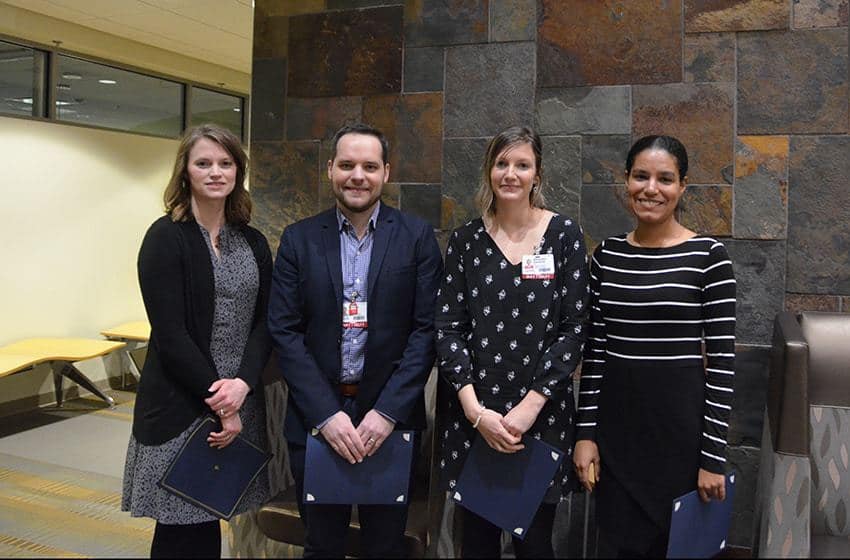Five Grants Presented to UAMS Cancer Researchers
| Jan. 29, 2018 | Five newly awarded grants will assist scientists at the UAMS Winthrop P. Rockefeller Cancer Institute in their search for new and innovative cancer treatments.
The grants of $10,000 each were presented to young investigators by the Envoys, a volunteer advocacy group of the Cancer Institute Foundation, during their “Doctor is In” reception and research poster showcase Jan. 25.
The grants are made possible by the Envoys’ annual RockStar Lounge fundraiser. This year’s event is set for April 13 at Cajun’s Wharf in Little Rock and will feature a performance by Bon Jovi tribute band Slippery When Wet.
“In an era when research funding has become more and more scarce, we are grateful to the Envoys for providing this essential support for our scientists,” said Cancer Institute Director Peter Emanuel, M.D. “With these start-up funds, they are able to establish the preliminary data needed to secure additional larger grants in the future.”
Recipients of the grants were:
- Marie Burdine, Ph.D., assistant professor in the Department of Surgery, UAMS College of Medicine
Burdine’s project focuses on a novel approach to regulating a protein known as ATAD2 that is highly expressed in several types of cancer, including breast, pancreas, colon and liver, as well as in metastatic disease. If successful, regulation of the protein could lead to new therapies for these types of cancer.
- Brendan Frett, Ph.D., assistant professor in the Department of Pharmaceutical Sciences, UAMS College of Pharmacy
Precision lung cancer treatment is often effective only for the short term due to significant differences that appear in individual cases of the disease. Frett’s objective is to improve the long-term outcomes of precision lung cancer therapy by simultaneously targeting multiple facets of the disease. He will synthetically engineer single molecule drug candidates capable of impairing multiple tumor survival pathways.
- Samantha Kendrick, Ph.D., assistant professor in the Department of Biochemistry and Molecular Biology, UAMS College of Medicine
Kendrick’s project focuses on understanding how and why certain genes repeatedly mutate and contribute to the aggressive nature of B-cell lymphoma. Her research examines the frequency of DNA structures in these specific gene targets and whether the structures contribute to an increased susceptibility to mutation. Uncovering this process can facilitate the design of new therapies to minimize the risk of chemotherapy resistant disease.
- Analiz Rodriguez, M.D., Ph.D., assistant professor in the Department of Neurosurgery, UAMS College of Medicine
Although advances in immunotherapy have offered great promise for several types of cancer, outcomes for an aggressive form of brain cancer known as glioblastoma remain grim. Rodriguez’s project uses the surgical technique laser thermal ablation in combination with immunotherapy to alter the immune microenvironment, cause cancer cell death and open the area around the tumor in an effort to improve outcomes for patients with this disease.
- Erming Tian, Ph.D., M.B.A., assistant professor in the Department of Internal Medicine in the UAMS College of Medicine
Tian’s research addresses the role of two alias proteins produced by the gene MYC in the outcome of patients with multiple myeloma. He seeks to understand how one of these proteins affects the other in regard to cell proliferation and will use this knowledge to deliberately induce a different translation and modification of the gene that could ultimately lead to preventing uncontrollable cancer growth.

